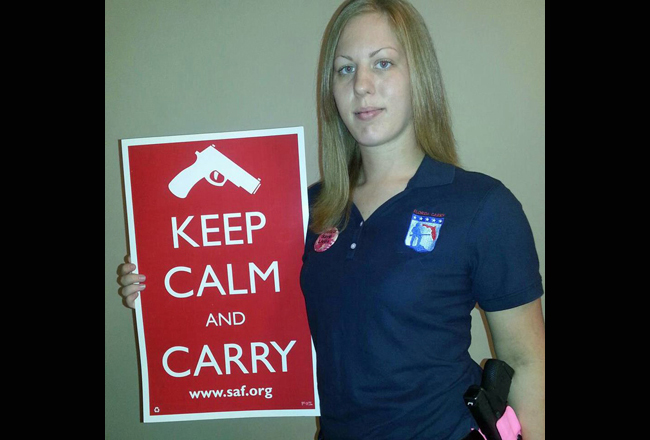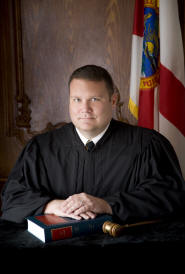
Alexandria Lainez, a business student at the University of North Florida in Jacksonville, is celebrating. On Tuesday, the District Court of Appeal for the First District in Tallahassee upheld her challenge of a UNF rule banning firearms on campus. The full court voted 12-3 to overturn a Duvall Circuit Court decision that had upheld the university’s ban. (See the full opinion, concurrences and dissents below.)
UNF’s policy, spelled out in its student handbook, barred “on-campus possession or use of any object that is classified as a weapon under Florida law including firearms, explosives (including fireworks), dangerous articles or substances, weapons (including non-lethal weapons such as pellet guns, bb guns, paintball guns, swords, including decorative swords, axes, pocket knives that are larger than the legal size defined by law or items that resemble weapons, or the use of any item used as a weapon.”
In 2011, the Legislature passed a law pre-empting all local governments from regulating firearms. The new law mandated that all such regulations—if any—rested in the state’s hands. Lainez, who is a member of Florida Carry Inc., the pro-gun pressure group, asked the university to remove its weapons ban. The university refused. Lainez and Florida Carry sued in October 2011 to stop the university from enforcing the rule.
“The Legislature has declared all regulation of firearms to be preempted by the Legislature,” the complaint stated, “and has determined that students should be allowed to possess and/or store firearms in private automobiles on university campuses, and that there is no need for additional regulation of firearms by UNF.”
UNF argued that state law “expressly permits universities to regulate firearms on university property.” While the law forbids public or private employers from prohibiting customers or employees from keeping guns in their cars, the law does, in fact, make an exception for “any school property,” and defines school to mean “any preschool, elementary school, middle school, junior high school, secondary school, career center, or postsecondary school, whether public or nonpublic.” UNF is a public, postsecondary school.
A trial court agreed. The appeal court did not.

By law, Judge L. Clayton Roberts argued for the majority, “school districts” are “distinct legal entities that do not operate and control state universities,” so the university does not qualify as a school district. But to reach that conclusion, Roberts skirted the explicit wording of state law and relied on the Constitution’s definition of a “school district” that limits those districts to traditional, non-postsecondary schools—even though the Constitution hives university boards the power to regulate their grounds as they see fit.
“While school districts may adopt a waiver disallowing securely encased firearms in vehicles parked on campuses under their authority, neither UNF nor the UNF Board of Trustees qualifies as a school district under” state law, Roberts concluded, though it is the same section of law Roberts cites that includes postsecondary schools among those that may “adopt written and published policies” that regulate firearms on campus.
“The trial court needs to revisit its ruling with regard to the University’s policy against lawfully storing securely encased weapons ‘in their vehicle[s] while on any University property or University-controlled property,’” Judge Robert Benton wrote in one of several concurrences. “But a sweeping declaration that “[a]ll UNF rules and administrative regulations regarding firearms are null and void,” as demanded in the first amended complaint, is plainly unwarranted.”
Three judges dissented.
“These opinions pursue differing legal theories but they all arrive at the same conclusion,” Judge Philip Padovano wrote in his dissent: “That a state university is powerless to prohibit students from bringing firearms to school. This remarkable conclusion is not supported in the law and, with due respect for my colleagues, I believe that it defies common sense.”
“State universities,” Padovano continued, “have independent constitutional authority to adopt rules and regulations governing the conduct of their students. Because the regulation at issue in this case falls directly within the scope of that authority, it is not subject to legislative preemption. Although we may disagree with the legal analysis in the trial court’s order, the decision we have for review on appeal is nonetheless correct and it should be affirmed.”
Padovano said the majority’s focus on the trial court’s erroneous legal analysis did not address the correctness of the decision, but rather the “validity of the reasons” behind that lower court’s decision. As such, the majority skirted the matter of law. “The order under review in the present case should be affirmed on the ground that the university had independent constitutional authority to adopt the regulation,” the judge wrote.
He added: “I believe that the University of North Florida had not only a right, but also a duty to adopt regulations such as the one before the court. It is fair to assume that most parents expect state universities to take reasonable precautions to ensure the safety of their daughters and sons while they are in school. This regulation was plainly designed as a safety measure. Whether it succeeds in that goal is, of course, debatable. Some would argue that the best way to keep students safe on campus is to allow them to be armed, while others would argue that the best way to ensure their safety is to prohibit guns on campus. But the debate on the merits of the policy is beside the point. We are dealing here only with the authority to adopt the regulation, not the wisdom of the regulation. If the university concludes that the best way to protect students is to prohibit guns on campus, it is not for the Legislature or the courts to interfere with that judgment.”
![]()
Click to access guns-on-campus-opinion.pdf





























Anonymous says
I know it’s not a popular view, but I think this was the right decision. I say that with the following caveat: I am not a gun nut, but I believe that a personal vehicle is an extension of one’s home, and as such it shouldn’t be subject to unreasonable searches or legislation prohibiting items within it that wouldn’t apply equally to a home. I know florida has legislation that places restrictions on such items within vehicles on k-12 school property, but I’m not a huge fan of it because such legislation is really nothing more than feel-good lawmaking that gives politicians the ability to point and say “see, I have a strong stance against gun violence at schools” when it in fact does nothing to prevent the (at this point) unpreventable, e.g. a shooter on campus with a gun, who isn’t going to care that possessing a gun in a vehicle on campus is against the law.
Jane says
“to reach that conclusion, Roberts skirted the explicit wording of state law and relied on the Constitution’s definition of a “school district” that limits those districts to traditional”
The explicit wording of the state law does not define a school district, only a school. Roberts specifically addresses this disparity in his response (pp. 6-7) and cites case law which prescribes that the language therefore be given its “plain meaning”. (Sch. Bd. of Palm Beach Cnty. v. Survivors Charter Sch.). In this case, the term “school district” is defined in the Florida Constitution, and therefore that definition is a generally accepted (nay, preferred) source for the term’s plain meaning.
“State universities,” Padovano continued, “have independent constitutional authority to adopt rules and regulations governing the conduct of their students. Because the regulation at issue in this case falls directly within the scope of that authority, it is not subject to legislative preemption.”
While Padovano feels that the UNF regulation “falls directly within the scope of that authority”, the actual text of the constitutional amendment does not support his contention, even explicitly stating that for the purpose of funding, “The board’s management shall be subject to the powers of the legislature”: (http://www.leg.state.fl.us/Statutes/index.cfm?Mode=Constitution&Submenu=3&Tab=statutes#A9 ) If the amendment’s written intent was to limit the Board of Governor’s power over questions of funding, how much more so matters of constitutional right and explicit legislative language? In direct opposition to Padovano, the majority opinion concurs that no such authority is granted the Board of Governors.
[email protected] says
Good one should not loose their rights because of nut jobs who se every gun as bad. well unless its their gun.
Steve says
The appeals court decision is beyond belief and represents nothing more than legal gymnastics in the service of allowing anyone to carry a firearm virtually anywhere. The law clearly states that colleges and universities can choose to ban firearms on campus, as they should. Judge Padovano put it very well in his dissent: “This remarkable conclusion [overturning the lower court] is not supported in the law and, with due respect for my colleagues, I believe that it defies common sense.” Helluva way to commemorate the one-year anniversary of Newtown.
confidential says
To say the least ..just a pathetic ruling and just plain disrespecting the memory of all those shot to death by nuts or not with access to these weapons. We do not need a weapon to look cool in any university campus! Just making it easier for green light to kill.
Really? says
do you really think those who want to cause harm would abide if the ruling had been up held? you are not going to stop a lunatic intent on destruction with laws. just think about that for a minute.
Diana L says
Guns, baby, guns. How many are enough? Gun manufacturers won’t be happy until everyone has an arsenal in their bunkers.
Outsider says
In 2007, thity-three people (tragically) were killed in the Virginia Tech shooting. In 2008, six people were killed in the Northern Illinois University. Meanwhile, according to the Narional Institute on Alcohol Abuse and Alcoholism, 1825 college students die from unintentional alcohol related injuries EVERY year. Now which is the real threat and which is the boogeyman in the closet?
http://niaaa.nih.gov/alcohol-health/special-populations-co-occurring-disorders/college-drinking
Really? says
…..and as long as you bring some Slim Jims, you are welcome in my bunker.
BroInArms says
Try arguing this law on a military installation and see who comes out on top. My thing is if someone is going to carry a firearm in their vehicle they will, legally or not. People should be more worried about kids texting and driving around college campuses.
question says
Why would we want law abiding citizens armed in a place where these shootings keep taking place? They possibly could defend themselves and prevent other life loss, but no, we wont even give them the opportunity. People need to realize, you ban guns, the only thing youve done is take the weapons out of law abiding citizens hands. People that walk in to public buildings and open fire probably arent going to stop carrying guns because theres a law out there that says youre not allowed….
Rick says
“If guns are out lawed (where ever) only out laws will have guns.” It has been proven, more than once.
“Guns don’t kill people, people kill people.” Another proven, more than once.